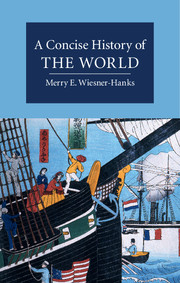Book contents
- Frontmatter
- Contents
- List of figures
- List of maps
- Introduction
- 1 Foraging and farming families (to 3000 BCE)
- 2 Cities and classical societies (3000 BCE–500 CE)
- 3 Expanding networks of interaction, 500 CE–1500 CE
- 4 A new world of connections, 1500 CE–1800 CE
- 5 Industrialization, imperialism, and inequality, 1800 CE–2015 CE
- Index
2 - Cities and classical societies (3000 BCE–500 CE)
Published online by Cambridge University Press: 05 October 2015
- Frontmatter
- Contents
- List of figures
- List of maps
- Introduction
- 1 Foraging and farming families (to 3000 BCE)
- 2 Cities and classical societies (3000 BCE–500 CE)
- 3 Expanding networks of interaction, 500 CE–1500 CE
- 4 A new world of connections, 1500 CE–1800 CE
- 5 Industrialization, imperialism, and inequality, 1800 CE–2015 CE
- Index
Summary
In 113 CE, when she was nearly seventy years old, the historian, poet, and scholar Ban Zhao accompanied her son to his new position in a rural district away from Luoyang, the eastern capital of Han dynasty China. Recounting the trip in a poem, she tells of her uneasiness and sadness as they pass through small fields and rundown villages, and writes:
Secretly I sigh for the Capital City I love, (but)
To cling to one's native place characterizes a small nature,
As the histories have taught us.
She pulls herself out of this mood by pouring a cup of wine and thinking about the philosopher Confucius, who had lived in a “decadent, chaotic age,” but had urged “truth and virtue, honor and merit,” and at the end of the poem writes stirringly that “Muscles stretched, head uplifted, we tread onward to the vision … and turn not back.”
Ban Zhao's love for the city was shared by her brother Ban Gu, also a historian, poet, and scholar, who wrote an ode in praise of Luoyang that became a classic of Chinese literature. Poets and scholars living at the other end of Eurasia in the cities around the Mediterranean shared this preference for urban life, especially those in Rome, the largest city in the world at the time Ban Zhao was writing. Here as well, educated urban residents generally saw the city as a place of rational behavior and the good life, and viewed themselves as more advanced and sophisticated than rural folk. They were more “civilized,” a word that comes from the Latin adjective civilis, meaning of or pertaining to citizens, and the origin as well of the English words “civic” and “civil.” The opposite opinion could also be found, however. In much of the Old Testament—and in some Greek, Roman, and Christian works—cities are portrayed as dens of iniquity and materialism, autocratic hierarchies ruled by tyrannical despots. Only by escaping to the pastoral countryside or to the wilderness could a person escape oppression and live a moral and pious life. Ban Gu himself expresses this opinion in a poem about the Western Han capital Changan, which he criticizes for wastefulness and extravagance.
- Type
- Chapter
- Information
- A Concise History of the World , pp. 69 - 134Publisher: Cambridge University PressPrint publication year: 2015

